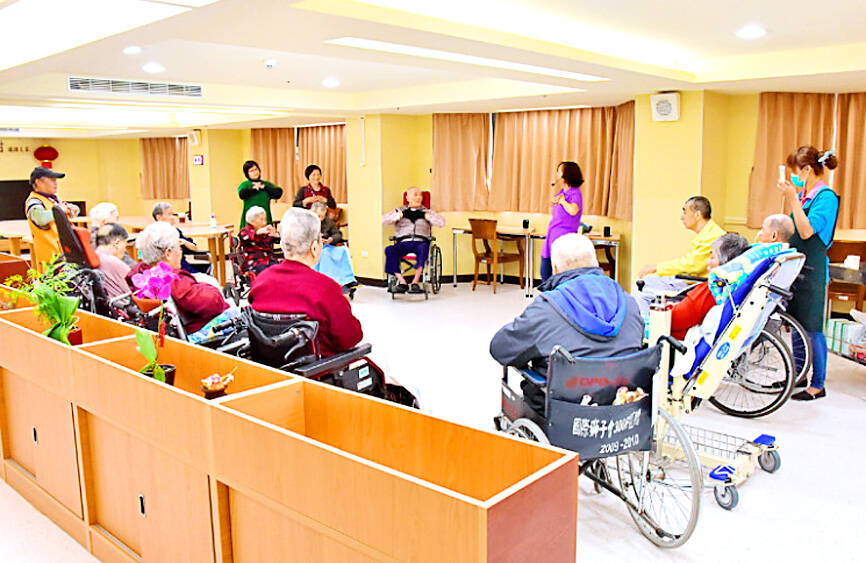More than one-quarter of the nation’s administrative regions became “super-aged societies” last year, ahead of the National Development Council’s predictions, Ministry of the Interior statistics showed.
The council estimated that Taiwan would become a super-aged society — meaning more than 20 percent of the population is aged 65 or older — next year.
In addition to Taipei, and Nantou, Yunlin and Chiayi counties, which became super-aged societies in 2022, Keelung and Pingtung County became super-aged societies last year, the ministry’s data showed.

Photo: Taipei Times file
Of the nation’s 22 administrative regions, six, or 27 percent, have become super-aged.
The WHO defines an “aging society” as one in which more than 7 percent of the population is aged 65 or older, an “aged society” as one in which more than 14 percent of people fit into that category and a “super-aged society” as one in which more than 20 percent do.
As people born in the 1950s and 1960s are now reaching retirement age and the nation’s birthrate is declining, Taiwan’s society is aging fast.
The crude birthrate last year dropped to 5.81 births per 1,000 people, a record low and much lower than the 30 to 40 births per 1,000 people between the late 1950s and early 1960s, the ministry’s statistics showed.
The number of deaths has been higher than the number of births per year for four consecutive years, with the population’s natural growth rate being minus-69,797 last year, the statistics showed.
In Chiayi County last year, 22.36 percent of people were aged 65 or older. The rate was 22.02 percent in Taipei, 20.83 percent in Nantou County, 20.63 percent in Yunlin County, 20.24 percent in Keelung and 20.14 percent in Pingtung County.
The cities and counties with the lowest percentage of people aged 65 of older last year were Hsinchu City with 14.76 percent, Lienchiang County with 14.89 percent, Taoyuan with 15.06 percent and Taichung with 15.79 percent.
However, according to the WHO’s definition, the youngest city in Taiwan is still an “aged society.”
Among the six special municipalities, Taipei was the first to become a “super-aged society,” and Kaohsiung, with 19.01 percent of its population aged 65 or older, is likely to become the second, followed by Tainan with 18.78 percent, New Taipei City with 18.02 percent, Taichung with 15.79 percent and Taoyuan with 15.06 percent.

Conflict with Taiwan could leave China with “massive economic disruption, catastrophic military losses, significant social unrest, and devastating sanctions,” a US think tank said in a report released on Monday. The German Marshall Fund released a report titled If China Attacks Taiwan: The Consequences for China of “Minor Conflict” and “Major War” Scenarios. The report details the “massive” economic, military, social and international costs to China in the event of a minor conflict or major war with Taiwan, estimating that the Chinese People’s Liberation Army (PLA) could sustain losses of more than half of its active-duty ground forces, including 100,000 troops. Understanding Chinese

The Ministry of Foreign Affairs (MOFA) yesterday said it is closely monitoring developments in Venezuela, and would continue to cooperate with democratic allies and work together for regional and global security, stability, and prosperity. The remarks came after the US on Saturday launched a series of airstrikes in Venezuela and kidnapped Venezuelan President Nicolas Maduro, who was later flown to New York along with his wife. The pair face US charges related to drug trafficking and alleged cooperation with gangs designated as terrorist organizations. Maduro has denied the allegations. The ministry said that it is closely monitoring the political and economic situation

UNRELENTING: China attempted cyberattacks on Taiwan’s critical infrastructure 2.63 million times per day last year, up from 1.23 million in 2023, the NSB said China’s cyberarmy has long engaged in cyberattacks against Taiwan’s critical infrastructure, employing diverse and evolving tactics, the National Security Bureau (NSB) said yesterday, adding that cyberattacks on critical energy infrastructure last year increased 10-fold compared with the previous year. The NSB yesterday released a report titled Analysis on China’s Cyber Threats to Taiwan’s Critical Infrastructure in 2025, outlining the number of cyberattacks, major tactics and hacker groups. Taiwan’s national intelligence community identified a large number of cybersecurity incidents last year, the bureau said in a statement. China’s cyberarmy last year launched an average of 2.63 million intrusion attempts per day targeting Taiwan’s critical

AGING: As of last month, people aged 65 or older accounted for 20.06 percent of the total population and the number of couples who got married fell by 18,685 from 2024 Taiwan has surpassed South Korea as the country least willing to have children, with an annual crude birthrate of 4.62 per 1,000 people, Ministry of the Interior data showed yesterday. The nation was previously ranked the second-lowest country in terms of total fertility rate, or the average number of children a woman has in her lifetime. However, South Korea’s fertility rate began to recover from 2023, with total fertility rate rising from 0.72 and estimated to reach 0.82 to 0.85 by last year, and the crude birthrate projected at 6.7 per 1,000 people. Japan’s crude birthrate was projected to fall below six,